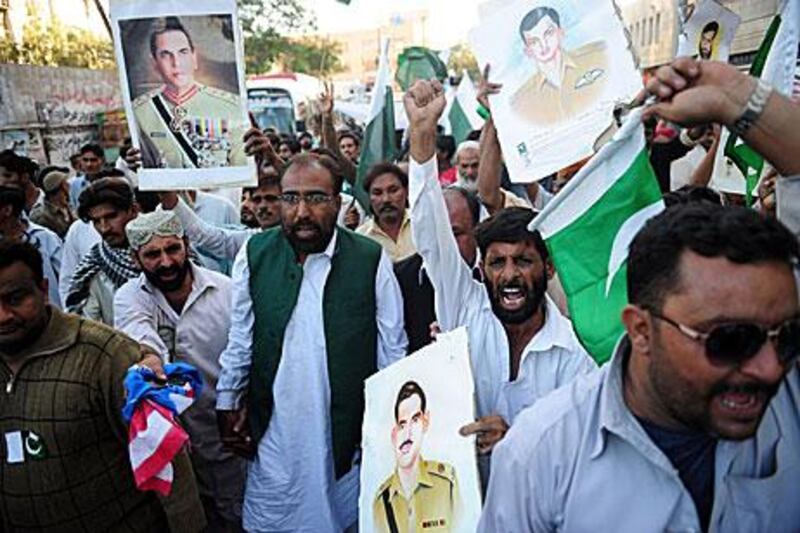RAWALPINDI, PAKISTAN // In what could be the biggest change in a decade in a relationship that has been a mainstay of US military and counterterrorism policy since the September 11 attacks, the US and Pakistan are lowering expectations for what the two nations will do together and planning for a period of more limited contact.
The change described by both Pakistani and US officials follows a series of diplomatic crises over the past year that strained an already difficult partnership based around the US goal of stability in Afghanistan and Pakistan and a reduction in Islamic-inspired terrorism.
For Pakistan, cooperation on that agenda was rewarded with billions in financial aid. The change means less cooperation with Washington and a willingness to swear off some aid that often made Pakistan feel too dependent, and too pushed around.
For the United States, scaling down an expensive military and economic programme that has not met expectations could come at the cost of less Pakistani help in ending the war in next-door Afghanistan.
Both US and Pakistani officials said the November killing of 24 Pakistani soldiers in a Nato air strike and Washington's refusal to outright apologise for the deaths has been a game changer in a relationship characterised by mistrust and mutual acrimony.
In the US, civilian and military officials have called the friendly fire incident a tragedy caused by mistakes on both sides, but insist that Pakistan fired first. Pakistan denies that, and has called the incident an unprovoked attack.
Pakistan's loudly angry reaction has, if anything, hardened attitudes in Congress and elsewhere that Islamabad is untrustworthy or ungrateful.
A senior Obama administration official conceded that the deaths made every aspect of US cooperation with Pakistan more difficult, and that the distance Pakistan has imposed may continue indefinitely.
Pakistan has already stopped billing the US for its anti-terror war expenses under the 10-year-old Coalition Support Fund, set up by Washington after the September 11 attacks to reimburse its many allies for their military expenses fighting terrorists worldwide.
"From here on in we want a very formal, business-like relationship. The lines will be drawn. There will be no more of the free run of the past, no more interpretation of rules. We want it very formal with agreed upon limits," the military spokesman, General Athar Abbas, said.
Pakistan will further reduce the number of US military people in Pakistan, limit military exchanges with the US and rekindle its relationship with countries with which it shares a border, such as China, which has been a more reliable ally according to Islamabad. Last year Pakistan signed a deal with China for 50 JF-17 fighter jets.
Pakistan retaliated for the friendly fire deaths by shutting down Nato's supply routes to Afghanistan and kicked the US out of an air base it used to facilitate drone attacks in Pakistan's tribal belt. Both US and Pakistani officials expect more fallout, most likely in the form of additional tolls or taxes on Nato supplies into Afghanistan through Pakistan. There could also be charges for use of Pakistani airspace, said some officials in Pakistan.
Pakistan also asked the US not to send any high-level visitors to Pakistan for some time, the US official said. After past crises, including the flare-up of anti-US fervor following the killing of Osama bin Laden by US forces in May, Pakistan had accepted top-level US officials for a public peace-making session.
US officials said they would like to mend fences quickly, but the senior administration official and others said they assume there will be less contact, fewer high-profile joint projects and fewer American government employees living and working in Pakistan.
Some US politicians are calling for an aid cut off to Pakistan, arguing that the US has little to show for billions sent to Pakistan over the past decade. A total aid cutoff is extremely unlikely, but Congress has already trimmed back the Obama administration's latest request and is expected to demand less generosity and more strings over the coming year.
Gen Abbas said US cash payments since teh Coalition Support Fund was create have been erratic. Currently the US is withholding US$600 million (Dh2.2bn) that was promised last year.
"The equipment we have been getting from America over the last five years has been almost a trickle," said former national security advisor retired General Mahmud Durrani.
He complained of "second-hand helicopters that were badly refitted".
Less aid might propel Pakistan towards greater financial independence, he said.
"If the money stops we can get our act together and manage. It is not the first time that American money has dried up and maybe we need to go cold turkey. Maybe in the long term we will be saying, 'Thank God this happened.'"





